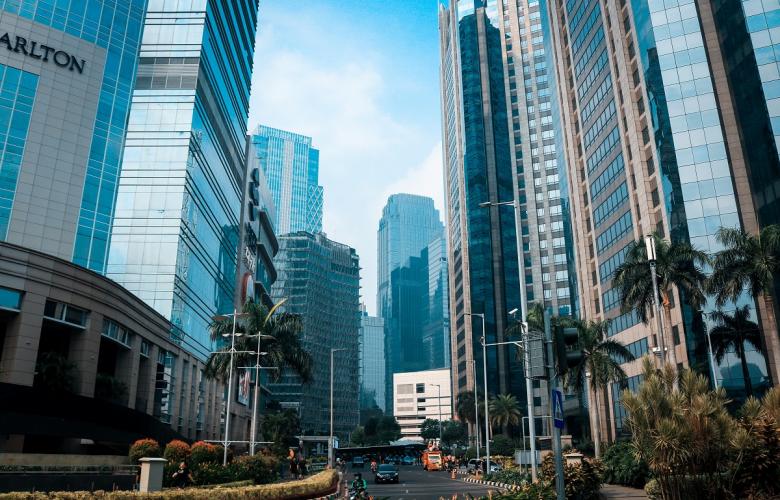Betting on Indonesia
Contact
Betting on Indonesia
"Indonesia is maturing as a nation, as an economy and as real estate market." CBRE
Home to over 260 million, Indonesia is the most populous country in the southern hemisphere and the fourth most populous in the world but has yet to ignite in the way that economists and its government would have hoped despite the clear potential of this market.
On paper, Indonesia looks in as healthy shape as any time since nationhood. It is also one of the newest members of the G-20 and one of the fastest growing emerging markets globally. Growth in Southeast Asia’s biggest economy has been hovering around 5 percent since 2016. This remains below the 7 percent targeted by the government, which is forecasting the gross domestic product (GDP) to expand by 5.3 percent this year, which would be the quickest pace since 2013
While the improving economic indicators and the promise of supportive and sustainable demographics are justifiable reasons to be bullish, there are more immediate developments that we’re watching. Primarily, ongoing reforms to its political system are paving a smoother road for the longer-term fundamentals of Indonesia and will have implications for the economy and real estate sector.
Take the country’s recent election. For the first time in Indonesia’s history, the president, the vice president, members of the People’s Consultative Assembly (MPR), and members of local legislative bodies were elected on the same day. A total of 16 parties participated in the elections nationally, including four new parties, in a new voting process that was framed by the ballots from over 190 million eligible voters, or the third largest democratic process on Earth.
As expected, on May 21 the General Elections Commission of Indonesia (KPU) officially confirmed that incumbent President Joko ‘Jokowi’ Widodo’s defeated rival Prabowo Subianto in last month’s Indonesian general election. Jokowi will be inaugurated for his final five-year Presidential term on October 20 and will become the second leader to be re-elected since sovereignty.
While indications remain that Prabowo has vowed to appeal the result, with the matter possibly proceeding to the Constitutional Court, Jokowi now possesses a stronger mandate than his first term. Specifically, we see his re-election as the impetus to follow through on his main campaign pledge of continuing to develop and complete massive new infrastructure projects.
This pledge spells good news for Indonesia, its longer-term economic future and international competitiveness. National investment in infrastructure has lagged for several decades, prompting Jokowi to prioritize infrastructure spending in his first term. As a result, the country saw significant investment in new highways, railways, airports and seaports across the country.
While not all projects have proceeded smoothly, notable successes include Phase 1 of the Jakarta Mass Rapid Transit (MRT) system, which opened for general use in March this year. It is hoped the MRT will alleviate the city’s traffic gridlock as well as unlocking new areas for investment and development.1
As in other economies, infrastructure development and new government mandates have clear and present implications for real estate. Indonesia has been no exception with activity muted for the majority of 2018. Most investors moved into wait-and-see mode well ahead of the election, but recent months have seen an uptick in land banking, project planning and enquiries for en-bloc assets from local and foreign investors anticipating a Jokowi victory.
Provisional figures released shortly after polls closed on April 17 pointed to a Jokowi win and this boosted market sentiment. Additionally, confirmation of his victory is expected to result in the greenlighting of real estate projects as investors look to capitalize on the next five-year programme of infrastructure spending, particularly in areas outside Jakarta.
Global investors have also taken notice of the anticipated and eventual Jokowi victory. Enquiries from overseas buyers have been especially strong in recent quarters, with many groups engaging in discussions to form joint ventures with local developers to co-develop new residential schemes in Greater Jakarta. In contrast to their previous short-term view towards Indonesia, many foreign investors are now adopting longer-term investment horizons of 7-10 years.
In terms of specific measures directed at the real estate market, Jokowi’s administration has indicated that it intends to reform tax regulations related to luxury and super luxury residential property, a move that should benefit sales activity in these segments. However, such measures are unlikely to be introduced until 2020 at the earliest, as the formation of the new administration will not be completed until later this year.
Among other sectors, growth in logistics demand will continue to attract foreign investors seeking opportunities to purchase high-specification warehouses, but the shift towards e-commerce is likely to weigh on shopping mall development and demand.
On the leasing side, Jokowi’s win will provide reassurance to office occupiers, with demand in Jakarta expected to remain solid, led by the TMT and coworking sectors.
While some signs have emerged in recent days of the fragility of Indonesia’s democracy, in the form of riots in major cities, the Jokowi victory will likely have a positive impact on the real estate sector and the wider economy. Renewed activity in the property sector is clearly pointing to the support for Jokowi’s infrastructure pledges, while investors are expanding their horizon in the market. All of this adds up to an endorsement for Jokowi’s second term.
For more information about the Indonesia property market email Jonathan Hills, Senior Director and Editor-in-Chief, Asia Pacific Research, CBRE via the contact details below.
This article was previously published on Gapura Jakarta
Source: Jonathan Hill, CBRE
Similar to this:
Crown Group plans vertical waterfront city for Jakarta






